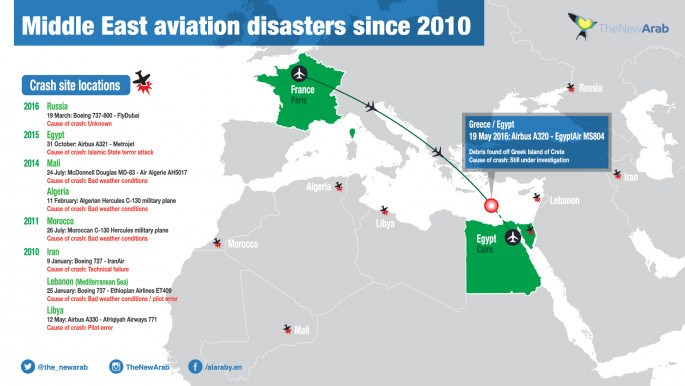Signals from EgyptAir black-box 'to stop in ten days'
The black box data recorders form the EgyptAir plane that crashed in the Mediterranean last month will stop emitting signals in ten days, according to officials.
The flight data and cockpit voice records have enough battery power to last until June 24, the Egyptian commission of inquiry said on Monday.If found, they could reveal whether it was a mechanical fault, a bomb or a hijacking incident that caused the Airbus A320 travelling from Paris to Cairo to go down on 19 May, killing 66 people on board.
Black boxes are designed to release signals for about a month after a crash, and locating EgyptAir MS804's flight recorder from the bottom of the Mediterranean - 3,000 metres below the surface - without such signals will prove more difficult.
On June 1, a French research vessel picked up signals emitted from one of the boxes and narrowed its position to within a 2km radius.
But to recover it from the sea-bed, investigators will need to pinpoint the signals to within just a few metres in order to establish whether the pingers are still connected to the recorders.
This will take at least another few days, according to investigators.
What we already know
Since the plane disappeared from radar in May, only small pieces of debris and some human remains have been retrieved from the crash site.
Egypt initially suspected the aircraft was brought down by an attack, but it is now thought the crash may have been caused by a technical fault.
Automatic alerts sent by the Airbus indicated smoke in the cabin and a fault in the flight control unit.
The crash occurred seven months after the bombing of a Russian airliner over Egypt's restive Sinai Peninsula in October, which killed all 224 people on board.
The Islamic State group claimed responsibility for that attack but there has been no such claim over the EgyptAir crash.
 |





![Israeli forces ordered bombed Gaza's Jabalia, ordering residents to leave [Getty]](/sites/default/files/styles/image_330x185/public/2176418030.jpeg?h=a5f2f23a&itok=_YGZaP1z)

